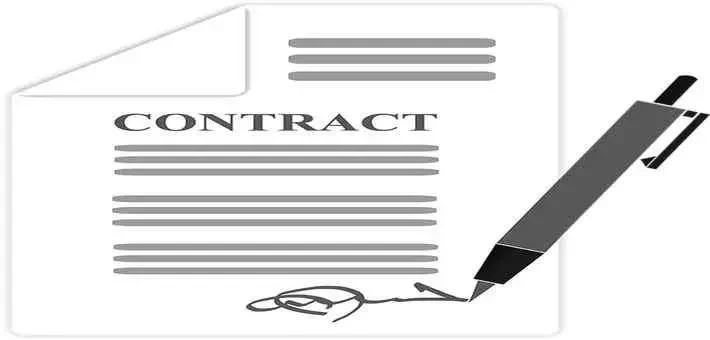The Contract Act 1872 MCQs
Essentials of a valid contract include Offer and acceptance, Competency of parties, Lawful consideration, Made with Free Consent, Lawful Object, Not declared as void. Here on MCQs.club we have prepared easy Multiple-Choice Questions on the Indian contract act 1872 that fully cover MCQs on Indian contract act bare act, mcq on Indian contract act 1872 with answers, ica 1872 bare act. These mcq on contract act 1872 with answers are helpful for Professional Accountancy exams, Competitive exams, Business management exams.
- Attempted performance –
- Where the promisor has made an offer of performance but the offer of performance of promisor is not accepted by the promisee
- It is also known as tender
- Both A&B
- None
- Types of tender include:
- Tender of goods or services
- Tender of money
- Both A&B
- None
- Tender of goods or services – Where the promisor offers to deliver the goods or services but the promisee refuses to accept. Its Effects include:
- Goods or services need not be offered again.
- Promisor may sue the promisee for non-performance and claim damages.
- Promisor is discharged from his liability i.e. he is not liable for non-performance.
- All of the above
- Tender of money – Where the promisor offers to pay the amount but the promisee refuses to accept the same. Its Effects include:
- Promisor is not discharged from his liability to pay the amount
- Promisor will not be liable for interest from the date of a valid tender
- Both A&B
- None
- Essentials of a valid tender include:
- Unconditional
- Proper Time, Place, Person
- Fixed amount and legal tender
- All of the above
- Persons who can perform a contract include:
- Promisor, Joint promisor and Promisor’s agent
- Legal representatives
- Third party
- All of the above
- Persons who can demand performance of contract include:
- Promisee, Joint promisees and Promisee’s agent
- Legal representative
- Third party
- All of the above
- Where two or more persons have made a joint promise, a release of one of such joint promisors by the promisee, does not discharge the other joint promisor or joint promisors; neither does it free the joint promisor so released from responsibility to the other joint promisor or joint promisors.
- The above statement is correct
- The above statement is incorrect
- Where the Time for performance is not specified:
- The contract must be performed within a reasonable time
- The promisor must perform his promise on that particular day during the usual hours of business and at a place where the promise ought to be performed.
- The promisee must apply for performance at a proper place and within usual hours of business.
- The promisor must apply to the promisee to appoint a reasonable place for the performance and to perform the promise at such place.
- Where the Time for performance is specified:
- The contract must be performed within a reasonable time
- The promisor must perform his promise on that particular day during the usual hours of business and at a place where the promise ought to be performed.
- The promisee must apply for performance at a proper place and within usual hours of business.
- The promisor must apply to the promisee to appoint a reasonable place for the performance and to perform the promise at such place.
- Where the Place for performance is specified:
- The contract must be performed within a reasonable time
- The promisor must perform his promise on that particular day during the usual hours of business and at a place where the promise ought to be performed.
- The promisee must apply for performance at a proper place and within usual hours of business.
- The promisor must apply to the promisee to appoint a reasonable place for the performance and to perform the promise at such place.
- Where the Place for performance is not specified:
- The contract must be performed within a reasonable time
- The promisor must perform his promise on that particular day during the usual hours of business and at a place where the promise ought to be performed.
- The promisee must apply for performance at a proper place and within usual hours of business.
- The promisor must apply to the promisee to appoint a reasonable place for the performance and to perform the promise at such place.
- In which of the following cases, time is usually considered to be the essence of contract?
- Where the parties have expressly agreed to treat the time as the essence of the contract.
- Where the non-performance at the specified time operates as an injury to the party.
- Where the nature and necessity of the contract requires the performance of the contract within the specified time.
- All of the above
- In case the performance is not made where time is essence, what consequences the breach will have?
- Voidable at the option of promisee.
- Promisee is entitled to claim compensation for any loss arising to him due to nonperformance of the promise at agreed time where performance beyond the stipulated time is not accepted.
- Promisee is not entitled to claim compensation for any loss arising to him due to nonperformance of the promise at agreed time where performance beyond the stipulated time is accepted, unless the promisee gives notice to the promisor of his intention to claim compensation.
- All of the above
- In case the performance is not made where time is not essence, what consequences the breach will have?
- Not voidable at the option of promisee.
- Promisee is entitled to claim compensation for any loss arising to him due to nonperformance of the promise at agreed time where performance beyond the stipulated time is not accepted.
- Promisee is not entitled to claim compensation for any loss arising to him due to nonperformance of the promise at agreed time where performance beyond the stipulated time is accepted, unless the promisee gives notice to the promisor of his intention to do so.
- All of the above
- Reciprocal promises – Promises which form the consideration or part of the consideration for each other are called ‘reciprocal promises’.
- True
- False
- Types of reciprocal promises include:
- Mutual and independent
- Mutual and dependent
- Mutual and concurrent
- All of the above
- When a contract consists of reciprocal promises to be simultaneously performed, the promisor need not perform his promise unless the promisee is ready and willing to perform his reciprocal promise.
- True
- False
- Where the performance of one party depends on the prior performance of the other party and the party who is liable to perform first, fails to perform it, then such party cannot claim the performance from the other party and must make compensation to the other party for any loss which the other party may sustain by the non-performance of the contract.
- False
- True
- Assignment of a contract means transfer of contractual rights and liabilities to a third party. Modes of assignment of contracts include:
- by act of parties
- by operation of law
- Both A&B
- None
- Assignment by act of parties takes place when the parties to a contract themselves make the assignment. Such an assignment is subject to which of the following rules?
- If it is a contractual obligation/right involving personal skill or ability than it cannot be assigned.
- If the contract expressly or impliedly provides that the contract shall be performed by the promisor only then such obligation cannot be assigned
- By Novation the promisor may transfer his liability to a third party with the consent of the promisee and the transferee.
- All of the above
- Assignment by operation of law takes place when the law intervenes. Such assignment takes place in which of the following cases:
- In case of death of any party the rights and obligation (other than those of personal nature) of the deceased party pass on to his legal representatives.
- In case of insolvency of any party the rights and obligations (other than those of personal nature) of the insolvent party pass on to the Official Receiver or Assignee.
- Both A&B
- None
Discharge of a contract
- Meaning of discharge is:
- A contract is said to be discharged when contractual relations between the parties to a contract are terminated or comes to an end.
- When the parties to a contract have either performed or are freed from the task of performing their respective obligations as arising from the contract.
- Both A&B
- None
- Modes of discharge of a contract include:
- By performance
- By agreement or by consent
- By operation of law
- All of the above
- A contract can be discharged by mutual agreement by:
- Novation, Rescission
- Alteration, Remission
- Waiver, Promisee’s refusal / neglect
- All of the above
- Which of the following is correct regarding Novation?
- Novation means the substitution of a new contract for an old one.
- A novation ordinarily arises when a new individual assumes an obligation to pay that was incurred by the original party to the contract.
- A novation also takes place when the original parties continue their obligation to one another, but a new agreement is substituted for the old one.
- All of the above
- Alteration – means a variation made in the language or terms of a contract with mutual agreement. When this occurs, the original contract is discharged and a new contract is created. The parties in alteration remain same.
- True
- False
- A contract may be discharged by operation of law by:
- Death
- Insolvency
- Material alteration
- Same identity
- All of the above
- When a person’s debts exceed his assets, he is adjudged insolvent and his property stands vested in the Official Receiver or Official Assignee appointed by the court. Such person cannot:
- Enter into contracts relating to his property
- Sue
- Sued
- All of the above
- Material alteration – A contract is discharged if the terms of the contract are materially altered without getting prior consent of parties. A material alteration is one which change following in a significant manner:
- Legal identity of the contract
- Character of the contract
- Rights and liabilities of the parties to the contract
- All of the above
- Supervening impossibility – When a contract is valid at the time of formation and becomes impossible to perform subsequently it is called effected by supervening impossibility.
- The above is correct
- The above is incorrect
- The effects of supervening impossibility are:
- A contract becomes void when an act becomes impossible after the formation of the contract.
- A contract becomes void when an act becomes unlawful by reason of some event beyond the control of promisor.
- A promisor is liable to compensate the promisee for any loss which arose due to nonperformance of promisor when the promisor hides the impossibility of performance.
- All of the above
- Identify the cases where a contract is discharged by supervening impossibility:
- Destruction of subject matter
- Death or personal incapacity (doctrine of frustration)
- Declaration of war
- Particular state of things ceases to exist or occur
- All of the above
- Identify the cases where a contract is not discharged by the supervening impossibility:
- Difficulty of performance
- Commercial impossibility
- Default of a third party
- Strikes, lockouts and civil disturbances
- All of the above
- Supervening illegality – If the performance of the contract becomes unlawful due to a change in the law after the formation of the contract then the contract is said to be discharged.
- The above is correct
- The above is incorrect
- If a party refuses or fails to perform his part of the contract then the contract is said to be discharged due to breach. A breach of contract may occur due to:
- Actual breach of contract
- Anticipatory breach of contract
- Both A&B
- None
- Actual breach of contract occurs when a party to a contract refuses or fails to perform his part of the contract at the time fixed for performance. Actual breach of contract occurs:
- Due date of performance – If any party to a contract refuses or fails to perform his part of the contract at the time fixed for performance
- Course of performance – If any party has performed a part of the contract and then refuses or fails to perform the remaining part of the contract
- Both A&B
- None
- Anticipatory breach of contract occurs when before the performance is due the party acts in a way that the contract may not be performed. A party may be intended not to perform the contract due to:
- Refusal to perform promise
- Disabled to perform promise
- Both A&B
- None
Remedies for breach of contract
- Remedy – A remedy can be defined as a manner in which a right is enforced or satisfied by a court when some harm or injury, recognized by society as a wrongful act, is inflicted upon an individual.
- The above definition is correct
- The above definition is incorrect
- Remedies can be categorized into:
- Common law remedies
- Equitable remedies
- Quantum meruit claim
- All of the above
- The various remedies available to an aggrieved party are:
- Rescission of contract
- Restitution, Damages
- Specific performance, Injunction, Quantum meruit
- All of the above
- Which of the following is correct for Rescission of contract?
- Rescission is the putting an end to a contract
- Rescission means a right not to perform your obligation
- Both A&B
- None
- When is rescission granted by the court?
- Where the contract is voidable at the option of the aggrieved party
- Where the contract is unlawful for causes not apparent on its face and defendant is more to blame than the plaintiff
- Both A&B
- None
- When is rescission not granted by the court?
- Where the aggrieved party has expressly or impliedly ratified the contract
- Where owing to the change of circumstances, the parties cannot be restored to their original positions
- Where the third party has acted in good faith and for consideration
- Where only part of a contract is sought to be rescinded and such part is not severable from the rest of the contract
- All of the above
- Specific performance is a discretionary remedy, which is allowed only in a limited number of cases such as:
- Monetary compensation is not adequate
- Actual damage cannot be ascertained due to non-performance
- It is probable that compensation in money on non-performance cannot be obtained
- All of the above
- In which of the Following cases suit for specific performance is not maintainable:
- Monetary compensation is considered as an adequate remedy
- Contract is of personal nature, e.g. contract of services
- Court cannot supervise the performance of the contract e.g. construction of building
- All of the above
- Kinds of damages are:
- Ordinary Damages, Special damages
- Exemplary (vindictive) damages, Nominal damages
- Liquidated damages, Penalty
- All of the above
- Ordinary damages are those which arise naturally in the usual course of things from the breach itself. These damages can be recovered if:
- The aggrieved party must suffer by breach of contract
- The damage must be a direct consequence of the breach of contract
- Both A&B
- None
- Exemplary (vindictive) damages are those which are awarded with a view to punish the wrong doer and not primarily with an idea of awarding compensation to the injured party.
- True
- False
- The court may award Exemplary (vindictive) damages in case of:
- a breach of promise to marry, where damages shall be calculated on the basis of mental injury sustained by the aggrieved party.
- wrongful dishonour of a cheque by a banker.
- Both A&B
- None
- Nominal damages are awarded where the injured party has sustained damage of a short but not of a substantial nature to be reckoned.
- Where the breach is technical and injured party has no intention of performing his part of the contract
- Where the injured party has not suffered any actual damage or fails to prove that he has
- Where damage is due to the fault of the injured party
- All of the above
- Which of the following is correct for Rules regarding amount of damages?
- The object of awarding damages is not to punish the party at fault
- The injured party is to be placed in the same position as money can do if the contract had been performed
- The aggrieved party can recover actual loss suffered by him arising naturally.
- All of the above
Indemnity and guarantee
- Contract of indemnity – A contract by which one party promises to save the other from loss caused to him by the conduct of the promisor himself, or by the conduct of any other person.
- The above definition is correct
- The above definition is incorrect
- Parties in a contract of indemnity are:
- Indemnifier
- Indemnified / Indemnity holder
- Both A&B
- None
- Contract of guarantee – A contract of guarantee is a contract to perform the promise or discharge the liability of a third person in case of his default.
- The above definition is correct
- The above definition is incorrect
- Parties in a contract of guarantee include:
- Principal debtor
- Creditor
- Surety
- All of the above
- Essentials of a contract of guarantee include:
- A contract of guarantee is a tripartite agreement between the principal debtor, creditor and surety.
- A contract of guarantee requires an existing debt or a promise whose performance is guaranteed which is enforceable at law.
- Consent is an essential for all the contracts similarly all three must have consented in a contract of guarantee.
- All of the above
- Kinds of guarantee are:
- Specific guarantee
- Continuing guarantee
- Both A&B
- None
- Specific guarantee –
- When a guarantee extends to a single transaction or debt
- The liability of the surety comes to an end when the guaranteed debt is duly discharged or the promise is duly performed.
- Both A&B
- None
- Continuing guarantee –
- When a guarantee extends to a series of transactions
- A surety’s liability continues until the revocation of the guarantee.
- Both A&B
- None
- Identify the Circumstances where surety is not discharged.
- Where a contract to give time to the principal debtor is made by the creditor with a third person, and not with the principal debtor.
- Patience on the part of the creditor to sue the principal debtor or to enforce any other remedy against him
- Where there are co-sureties, the release by the creditor of one of them does not discharge the other nor does it free the surety so released from his responsibility to the other sureties
- All of the above
—Part II ended—
Read more
Read more
Read more
Read more
Read more
Read more
Read more
Read more




